Exploring the Capabilities of Odoo SaaS for a Construction Company

Business Analyst and Project Manager

Odoo is tailored for the construction sector. It enhances project management, resource distribution, and financial oversight while providing a comprehensive solution for construction firms. Equipped with modules for project planning, procurement, accounting, and more, Odoo ensures effective teamwork and real-time oversight. These modules promote streamlined communication, efficient resource management, and precise financial supervision, boosting overall project success. Odoo’s intuitive interface and scalable design make it an ideal ERP solution for construction companies seeking to improve efficiency and profitability across their projects.
In the following article, we will explore which modules are most effective for managing and improving the processes of a construction company. By looking at these modules, we hope to provide a clear understanding of how they can help streamline operations and enhance efficiency in the construction industry.
CRM and Sales
A project typically begins with a sale, involving contract negotiations with a client. The sales team focuses their efforts on negotiating terms related to materials, labor rates, and sub-contractors.
Odoo CRM assists in organizing sales activities by tracking leads, closing opportunities, and providing accurate forecasts. It keeps your opportunities structured within the pipeline and manages daily tasks with meetings and upcoming activities.
The sales process begins when a lead is generated from an email or a completed website form. Once this lead is captured, the Sales Manager creates and manages a Sales Opportunity. The Sales Opportunity progresses through various customizable stages that reflect the current status of negotiations with the client. To facilitate the potential deal, the Sales Manager can create activities such as reminders, tasks, and scheduled meetings, which can be easily tracked in the calendar. All relevant information, including the time taken to process the lead, the speed of the opportunity’s progression in the pipeline, and other crucial metrics generated during the sales department’s operations, are logged in the system. This data is readily available for analysis in the Analytics and Reporting module, providing valuable insights into the sales process.
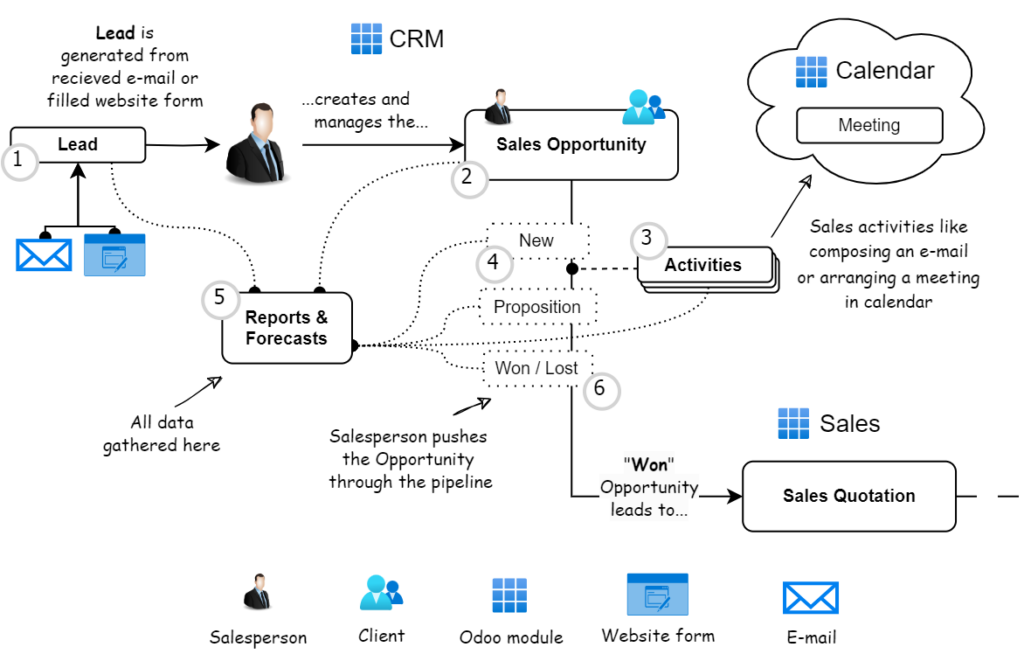
A Sales Quotation is generated after a sales opportunity is marked as “won”. The Sales Quotation details the quantities of services, materials, and the rates for the necessary labor or subcontractors required for the project. In Odoo Sales, salespeople can create reusable quotation templates for commonly offered materials or services. This feature allows for quicker customization and dispatch of quotations to customers, eliminating the need to start from scratch for each negotiation.
Once the quotation is finalized, it can be sent to the customer via post or email. Deadlines can be set on sales quotations to encourage prompt customer responses, minimizing the risk of losing a favorable deal. Additionally, deadlines protect the company by ensuring orders are fulfilled at profitable prices.
When the Sales Quotation is electronically signed by the customer, the responsible salesperson is instantly notified. This confirmation triggers the creation of a Sales Order, advancing the sales process toward fulfillment and invoicing.
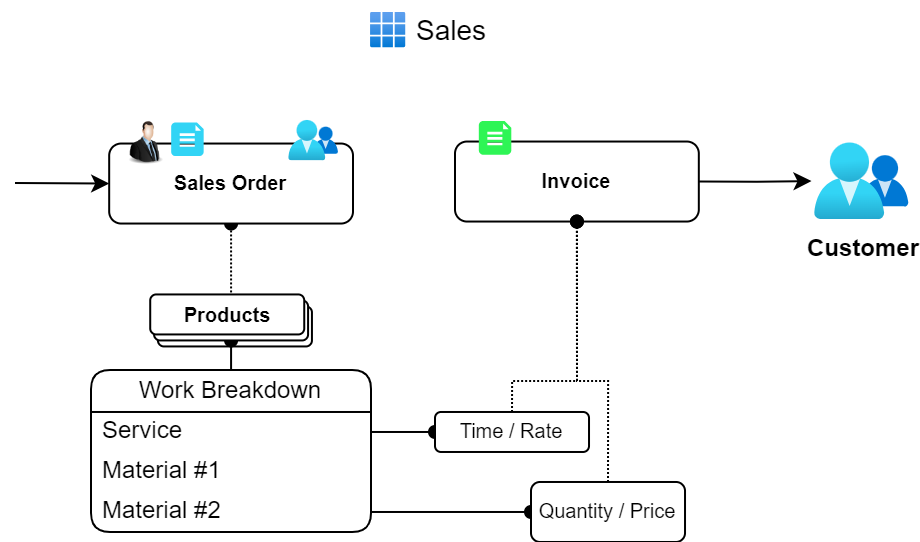
Project Management
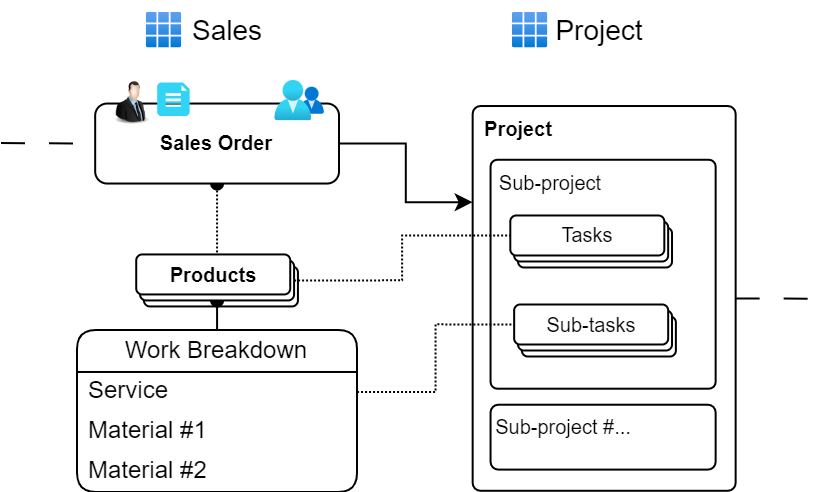
Once negotiations are concluded and the contract is signed, effective management of the project becomes essential. This can be efficiently handled using Odoo Project, a comprehensive tool designed for managing ongoing projects.
Odoo Project employs the Kanban project management system, which breaks down all projects into tasks categorized on a whiteboard according to their current phase in production. This visual representation aids in tracking the progress of each task.
Based on the Sales Order, the project and corresponding tasks are automatically generated. Each task is associated with a specific product, whether a service or material, and the Work Breakdown Structure is divided into sub-tasks for more detailed management.
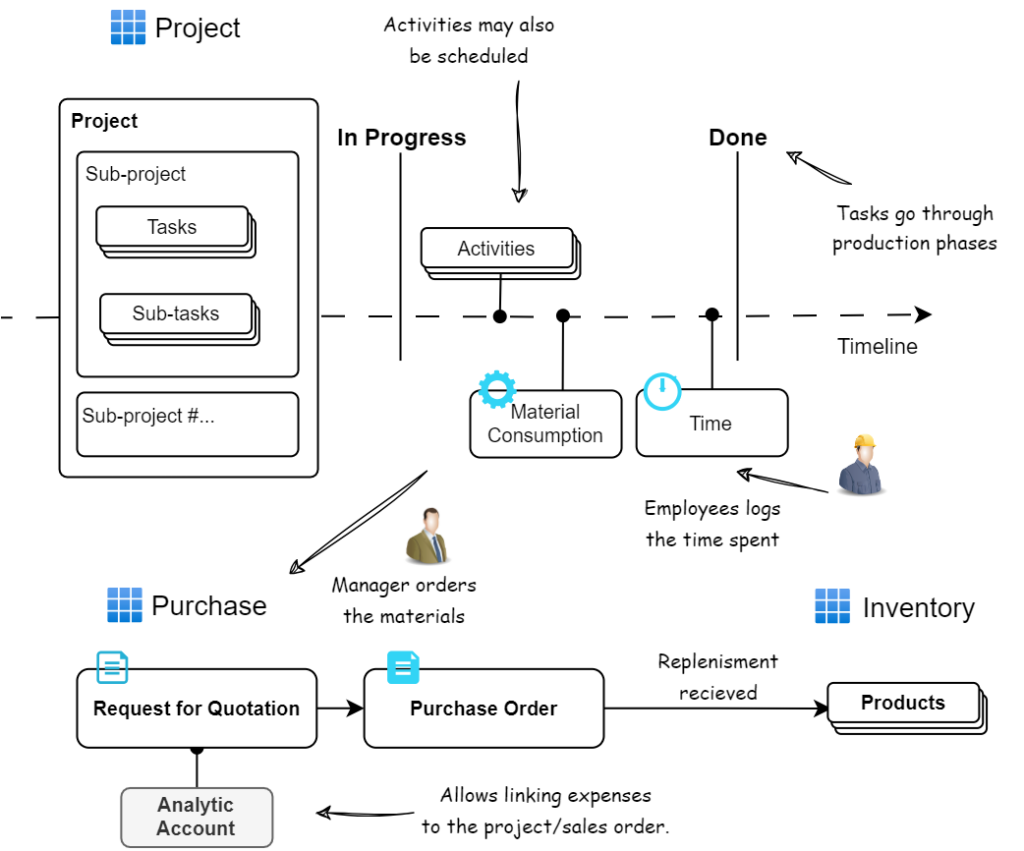
With Odoo Project, you can schedule tasks, assign activities to co-workers, and monitor the profitability of each project. This ensures that every aspect of the project is managed efficiently, contributing to the successful completion of the work and overall project success.
Accounting and Invoicing
For many companies or consultancies, managing accounts can become a significant challenge without the right personnel or software. In the modern era, selecting suitable software to support your human resources is a crucial decision, primarily resting on the shoulders of the proprietor. Choosing the best software can ensure peace of mind and efficient operations in the future.
Odoo Accounting is a comprehensive accounting application designed to enhance accountant productivity. It includes features like AI-powered invoice recognition, synchronization with bank accounts, and smart matching suggestions. These tools help streamline the accounting process and improve overall efficiency.
With Odoo ERP for service management, accounts can be meticulously managed through balance sheet generation, tax sheet preparation, and detailed tracking of expenses and revenues. The system also facilitates flawless invoice generation and proper management of project costs and estimation documents.
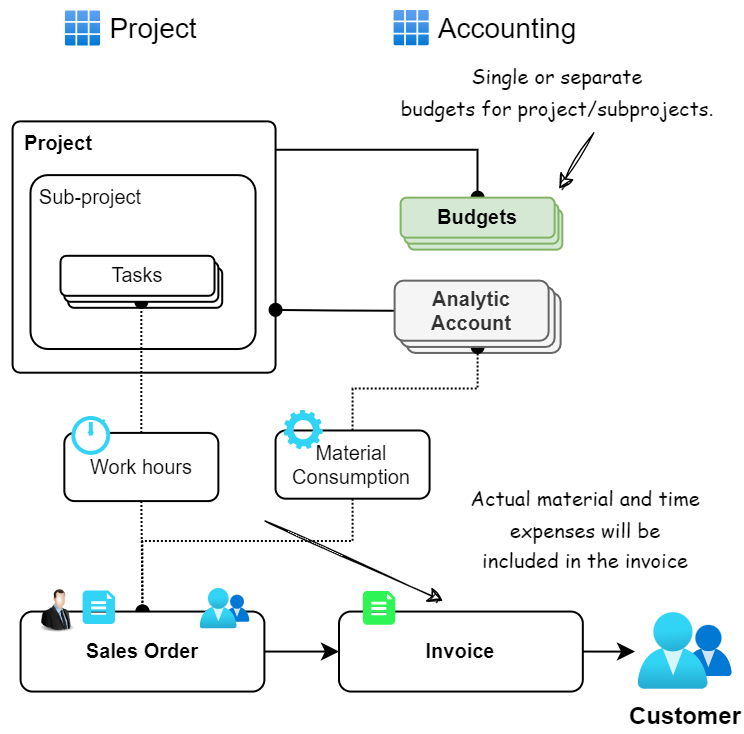
Depending on your business needs, there are different ways to automate customer invoice creation in Odoo. Typically, the system generates draft invoices based on information from sales orders or contracts. Accountants then only need to validate these draft invoices and send them out in batches via regular mail or email. This flexibility allows businesses to choose the most suitable method for creating and managing draft invoices, ensuring a seamless invoicing process:
In Odoo Sales, the default method is “invoice what is ordered,” where customers are invoiced once the sales order is confirmed. Alternatively, the “invoice what is delivered” rule invoices customers only after delivery is completed. This option is often preferred by businesses dealing in materials, liquids, or food in large quantities, where the ordered and delivered quantities might slightly differ, thus allowing invoicing based on the actual delivered quantity. Having these different invoicing options provides greater flexibility to meet diverse business needs.
The invoice includes data on the quantity and price of materials, as well as the time spent by workers, all derived from the Sales Order. This ensures accurate and transparent billing for the customers.
A down payment, which is a partial payment made by the buyer when the sales contract is concluded, signifies a full commitment from both parties to honor the contract. With a down payment, the buyer pays a portion of the total amount upfront and agrees to pay the remaining balance later. The seller, upon accepting the down payment, provides the goods or services, trusting that the rest of the payment will be settled subsequently.
Invoicing based on time and materials is typically used when it’s challenging to accurately estimate the project’s scope or when the project’s requirements may evolve. This method differs from a fixed-price contract, where a customer agrees to pay a specified total amount regardless of the actual costs incurred for employees, subcontractors, vendors, suppliers, etc. The Odoo Sales app can handle invoicing for time, various other expenses, and necessary purchases to fulfill an order.
For expensive or large-scale projects, invoicing based on project milestones can be employed. Milestones represent a clear sequence of work stages that lead to the project’s completion. This invoicing method ensures a consistent cash flow throughout the project’s duration. It also allows customers to monitor every phase of the project’s development closely and spread the cost over several installments rather than paying a lump sum all at once.
Learn more about Odoo Implementation with First Line Software
